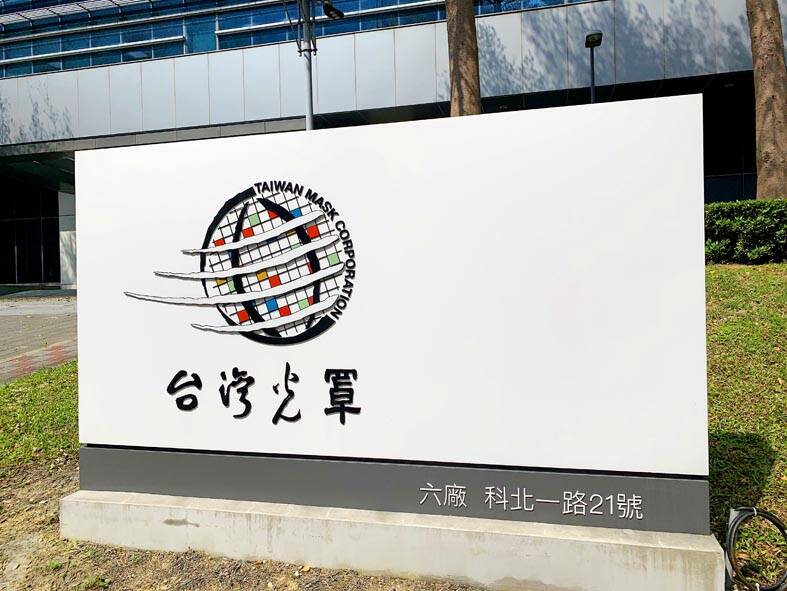Taiwan Mask Corp (台灣光罩), which specializes in producing photomasks used in semiconductor manufacturing, yesterday said it expects revenue to surge by almost 30 pecent to NT$10 billion (US$326.9 million) this year, buoyed by rising orders from major clients and higher average selling prices.
Revenue last year increased 27 percent to NT$7.74 billion.
Taiwan Mask said sales should gradually grow in the following quarters, after a projected decline of up to 24 percent to between NT$1.5 billion and NT$1.6 billion this quarter from NT$1.97 billion last quarter.

Photo: Grace Hung, Taipei Times
“The decline was mostly due to weakness in the consumer electronics segment,” Taiwan Mask president Lidon Chen (陳立惇) said. “We believe demand will pick up in the second half of the year.”
The first quarter should be the trough for this year, he said.
Revenue in the first two months of this year shrank 7.81 percent to NT$1.01 billion, as customer demand declined due to inventory correction.
Factory utilization is almost full and the company has seen a nascent recovery in demand from manufacturers of driver ICs used in touch panels, he said.
With ongoing plans for capacity expansion and technology migration this year, the company expects average selling prices to trend higher, Chen said.
As the company is scheduled to commence mass production of 40-nanometer masks later this year, revenue contribution from 12-inch masks would be higher than last year, another factor that would boost its average selling prices, it said.
Taiwan Mask has a 2 percent share of the global mask market and counts the world’s major foundry service providers among its customers.
The company plans to boost capital spending from NT$2.5 billion last year by between 20 and 40 percent to between NT$3 billion and NT$3.5 billion this year to focus on advanced technology.

Intel Corp chief executive officer Lip-Bu Tan (陳立武) is expected to meet with Taiwanese suppliers next month in conjunction with the opening of the Computex Taipei trade show, supply chain sources said on Monday. The visit, the first for Tan to Taiwan since assuming his new post last month, would be aimed at enhancing Intel’s ties with suppliers in Taiwan as he attempts to help turn around the struggling US chipmaker, the sources said. Tan is to hold a banquet to celebrate Intel’s 40-year presence in Taiwan before Computex opens on May 20 and invite dozens of Taiwanese suppliers to exchange views

Application-specific integrated circuit designer Faraday Technology Corp (智原) yesterday said that although revenue this quarter would decline 30 percent from last quarter, it retained its full-year forecast of revenue growth of 100 percent. The company attributed the quarterly drop to a slowdown in customers’ production of chips using Faraday’s advanced packaging technology. The company is still confident about its revenue growth this year, given its strong “design-win” — or the projects it won to help customers design their chips, Faraday president Steve Wang (王國雍) told an online earnings conference. “The design-win this year is better than we expected. We believe we will win

Chizuko Kimura has become the first female sushi chef in the world to win a Michelin star, fulfilling a promise she made to her dying husband to continue his legacy. The 54-year-old Japanese chef regained the Michelin star her late husband, Shunei Kimura, won three years ago for their Sushi Shunei restaurant in Paris. For Shunei Kimura, the star was a dream come true. However, the joy was short-lived. He died from cancer just three months later in June 2022. He was 65. The following year, the restaurant in the heart of Montmartre lost its star rating. Chizuko Kimura insisted that the new star is still down

While China’s leaders use their economic and political might to fight US President Donald Trump’s trade war “to the end,” its army of social media soldiers are embarking on a more humorous campaign online. Trump’s tariff blitz has seen Washington and Beijing impose eye-watering duties on imports from the other, fanning a standoff between the economic superpowers that has sparked global recession fears and sent markets into a tailspin. Trump says his policy is a response to years of being “ripped off” by other countries and aims to bring manufacturing to the US, forcing companies to employ US workers. However, China’s online warriors